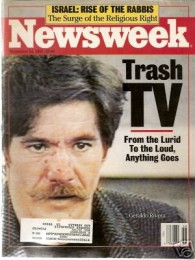Books on Class: A Round-Up

Two write-ups of fascinating new books today, both of which touch on matters of class. The first is an excerpt on Jezebel from The Essential Ellen Willis, who wrote for the Nation, the New Yorker, and other publications about music and pop culture from a feminist perspective. The second is a review of Alice Goffman’s book On The Run, about her sociological fieldwork among America’s urban poor.
Here is Ellen Willis on the ’90s explosion of daytime TV talk shows and the way the middle class recoiled from them in disgust:
At the dramatic center of talk shows are mostly black, Latino and low-rent white guests who, by their very willingness to expose intimate, “shameful” matters and yell and scream at each other on the air, assert their lack of deference to middle-class norms. …
While great popular art tends to bring disparate groups together — the way the Beatles reached teenyboppers and intellectuals, or Duke Ellington whites and blacks — talk shows are more likely to reinforce class and racial fragmentation. Though viewers from the same social milieus as the guests may identify with them and their problems, my hunch is that for many middle-class talk-show fans, the kick is feeling superior (or as my daughter put it when I posed the question, ‘’lucky”).
There’s much more. The excerpt is worth reading in full, especially for how it seems like those spectacle shows evolved into today’s Reality TV. Has the middle class stopped clutching its pearls and now bought in? Did the change of format make the shift palatable?
Meanwhile, at the New York Times, sociologist Alice Goffman is praised for immersing herself not in the jungles of Borneo but in the heart of darkness here at home:
The book [On the Run], from the University of Chicago Press, is a closely observed study of the impact of the criminal justice system on everyday life in a low-income African-American neighborhood of Philadelphia, and it is attracting interest well beyond academia. …
Ms. Goffman is hardly the first middle-class white observer to venture into black urban America and emerge with a marketable story to tell. But the intensity of her research — and her ability to remain in the background while keeping her eyes and ears (and notebook) open — set her work apart, colleagues say.
“The level of immersion is really unusual,” said Mitchell Duneier, a sociologist at Princeton, who supervised Ms. Goffman’s doctoral dissertation, on which the book is based. “She got access to the life of the ghetto and came to understand aspects of it we don’t ever get to see.”
Goffman herself gets points for batting away some of the more fawning / voyeuristic press:
“It just feels morally strange to talk about my own experiences when a whole community is dealing with violence and getting arrested,” she said in an interview in a Greenwich Village cafe this month, after giving the keynote address at a conference at New York University. After all, she added, “I could always just leave.”
But it still strikes me as strange to go so ga-ga about a person writing about life in Philly, especially when she’s a native of the city:
By her sophomore year at Penn, she had moved full time to a mixed-income African-American neighborhood and was hanging out on a tough strip she calls 6th Street (all names and places in the book are disguised), fully immersing herself in local culture.
She abandoned her vegetarian diet, listened only to mainstream hip-hop and R&B, and adopted local “male attitudes, dress, habits, and even language,” as she puts it in a long appendix, describing her research methods. While drugs, and drug selling, pervaded the neighborhood, she did not use them, she writes, partly because “it hampered writing the field notes.”
Hey, I saw that movie! Wasn’t it called Save the Last Dance?
I don’t know. Am I being oversensitive by being a bit squicked out by all of this? Or not sensitive enough? Let me have it, guys.
Support The Billfold
The Billfold continues to exist thanks to support from our readers. Help us continue to do our work by making a monthly pledge on Patreon or a one-time-only contribution through PayPal.
Comments